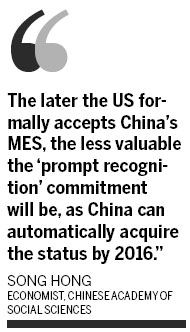Economy
US to recognize China's market economy status
By Lan Lan and Ding Qingfen (China Daily)
Updated: 2010-05-27 09:32
 |
Large Medium Small |
Analysts skeptical, noting status will be achieved automatically by 2016
BEIJING - The United States has agreed to recognize China's market economy status (MES) as soon as possible, according to a statement from the Chinese side on Tuesday upon the conclusion of the second round of the China-US Strategic and Economic Dialogue (S&ED).
According to the statement, "the US will recognize China's MES promptly via the cooperative forum of the Sino-US Joint Commission on Commerce and Trade".
"The wording means there has been no breakthrough at all regarding the recognition of China's MES," said He Weiwen, an executive council member of the China Society for WTO Studies.

The US just repeated the wording it used in the first round of the S&ED in Washington and at an ensuing meeting last year, he said.
China's Commerce Minister Chen Deming said on Monday that the US is yet to recognize China's MES and the two sides would continue discussions on this issue at upcoming meetings.
"The later the US formally accepts China's MES, the less valuable the 'prompt recognition' commitment will be, as China can automatically acquire the status by 2016," said Song Hong, an economist of international trade department under the Chinese Academy of Social Sciences.
|
||||
"But at least this shows the US is moving in the right direction", Song said, since the US nevertheless said it will, regarding trade remedy investigations, carefully consider and offer fair and reasonable treatment to Chinese companies that apply for market-oriented industry status, according to the statement.
"Fair and reasonable" treatment in trade remedy investigations should improve the situation of domestic companies exporting to the US. They now have to make a great effort to prove that they belong to market-oriented industries, Song said.
Due to China's failure to achieve MES, Chinese products are calculated based on the market prices of a substitute country - often with much higher production costs than China - as the benchmark instead of its real costs, making Chinese companies vulnerable to anti-dumping and anti-subsidy investigations.
"The US won't easily accept China's MES; instead, it will be used as a bargaining chip with China on other matters," said He Weiwen. For example, the US has been consistently calling for the full opening up of China's financial market to facilitate US financial giants' entry to the world's largest market.
And even after the US recognizes China's MES by 2016, trade remedies against Chinese products will not stop, they will continue or emerge in other forms, said Zhang Yansheng, director of the Institute of Foreign Trade of the National Development and Reform Commission.
